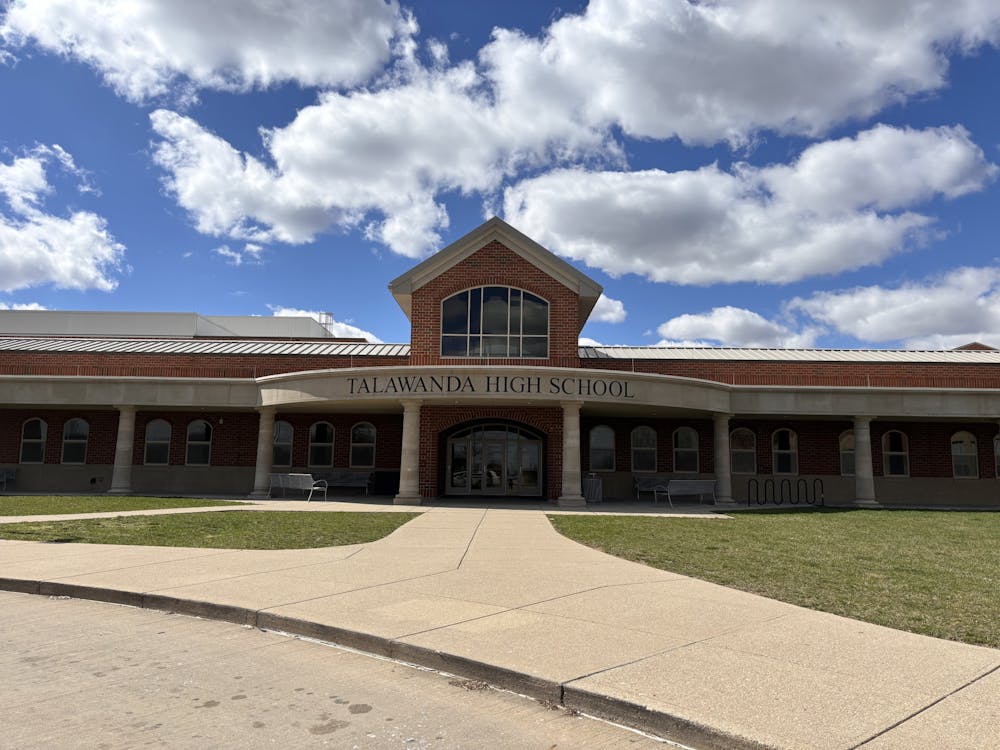When the bell rings at 3:15 p.m. at Kramer Elementary School, Alicia Johnson’s son packs up his book bag to go home.
He meets up with a group of kids from his neighborhood, but they won’t be waiting for the bus to pick them up. Instead, they will begin the 23-minute walk home down College Corner Pike, one of the busiest streets in Oxford.
He is 9 years old.
Around 3 p.m. on most weekdays, many students in the Talawanda School District begin their walk home after the Talawanda School District Board of Education voted to reduce busing as a result of budget cuts. The district moved to a single-tier service, meaning that busing is only provided for students in kindergarten through eighth grade who live outside of a two-mile radius from the school.
Because of the bus change, the start times of the elementary, middle and high schools have been modified as well. Since December 2023, the elementary schools start at 8:25 a.m., the middle school starts at 8 a.m. and the high school starts at 8:15 a.m.
Johnson had to rearrange her work schedule so she could take her son to school. Johnson is a caseworker for Butler County Job and Family Services, and all the caseworkers have a specific schedule.
“I come in later than all of the other caseworkers, but I also stay later,” Johnson said, “and I have to get approval to work outside of normal business hours.”
Because she can’t pick him up after school, he walks home with other kids in their neighborhood.
In December 2023, the board voted to return two-tiered busing, with the possibility of using a new service that would cost an additional $1 million. Shaunna Tafelski, the district’s treasurer, said this year’s busing contract cost the district $2,486,376, with excess costs expected to be $20,342. Tafelski said in previous years, the district has spent between $165,000 and $215,000 on busing.
While the board can vote on the financial implications of the service, the district’s Superintendent Ed Thereoux decides the logistics like routes and start times. Before the board members took a vote on the services, it developed a survey for parents and staff to share their feedback.
This was something that Molly Farler, a parent within the district, appreciated.
“I think they should have done the survey, and I think they should have done it a lot sooner,” Farler said. “I think once they knew they had the potential or the money to bring back busing … I think they should have done a survey to find out how the families felt about it and what the majority wanted.”
Enjoy what you're reading?
Signup for our newsletter
The survey asked parents to rank three options from their most preferred to least preferred: move to the new plan, which would move start times up for elementary students and back for middle and high school students, keep the current one-tier busing service, or return to the previous two-tier service which would push start times back for elementary students and up for middle and high school students.
“Not everybody works eight to five,” Hansel said. “So we got a lot of feedback about individual parents’ work schedules and those types of issues in regard to what time school would start at the different levels.”

Johnson chose to reinstate last year’s two-tier busing schedule because it works better with her work schedule, and it benefits her son’s behavior.
“I got a lot of emails from teachers saying that he’s more sleepy in class ever since his schedule changed,” Johnson said. “He didn’t adapt well to going in later in the day versus getting up earlier.”
It also affects his after school activities as well.
“He has ADHD, and kids need time to play and not just instruction or education,” Johnson said. “They need time for recreational purposes. The school schedule they’re on now, and the one that they’re proposing for next school year, would really hurt his after school play.”
Farler, who lives outside the two-mile radius from Talawanda Middle School, was not impacted by the busing changes. Farler works from home as a software trainer, so she drives her twins to Kramer, and her middle schooler rides the bus.
Farler said she recognizes that she is more fortunate than other parents because she has the flexibility to take her kids to school, but she hopes the board considers the financial implications that switching the busing services will have on the district.
“We went from ‘We need a levy’ to ‘We’ve got more money because of this property tax increase,’ but I just don’t know if this is the right place to spend it,” Farler said.
In fall 2022, the board placed an operating levy on the November ballot, which failed to pass. In fall 2023, Butler County property taxes were reappraised, which created revenue for the school district.
The survey was open for 13 days, and out of 1,880 families in the district, 971 completed the survey.
Based on the results, most parents were in favor of keeping the current plan in place with the one tier bus service. Returning to the previous two-tier bus service was ranked as the second preferable option by parents, with the new two-tier bus service ranked last.
In addition, Talawanda employees were also invited to take the survey. Out of 362 eligible employees, 295 completed it.
The employees were also favorable of keeping the current plan in place, with the previous two-tier bus service ranked second. The employees also ranked the new two-tier bus service last.
The board will present and discuss the results of the survey at a work session on May 9 at 6 p.m. at Talawanda High School. During the session, the board will not vote on a decision, nor host public participation, but it will inform their decision before the May 16 regular meeting in which a vote could happen.
While Hansel said she realizes whatever plan is decided is not going to work for every family, she thinks the board has established the best possible plan.
“[Parents] were formally given the opportunity to share their input on the options that are on the table,” Hansel said. “I think that's the best strategy that could have been put in place, and I look forward to hearing those results at the next school board meeting.”




